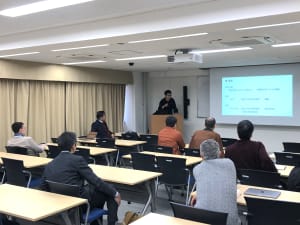Report
On Thursday, January 16, 2025, from 14:00, the Tōbunken Seminar titled "A new discovery of the 'Huihui Household Registers' in genealogical literature: On nine Muslim families in Jiangning County during the Ming dynasty (1368-1644)" was held, presented by Dr. Zheng Dechang (Fudan University). This seminar was held based on an exchange agreement with Fudan University.
In this presentation, a detailed analysis of Huihui Xiaoce, a newly discovered material related to a genealogy compiled by the Ma family during the Qing dynasty was provided, describing the history of nine Muslim families who settled in Jiangning County during the Yuan and Ming dynasties, religious policies of the Yuan and Ming periods, and various aspects of the fusion between Islamic and Chinese cultures. Ten participants attended the seminar, engaging in an active Q&A session on topics such as the nature and linguistic culture of the Huihui Household Registers during the Ming dynasty, the origins of the Ma family and their motivations for compiling genealogies, and the differences in religious policies between the Yuan and Ming dynasties.
Event Details
Date and Time: January 16, 2025, 14:00-15:30
Venue: Large Conference Room, Institute for Advanced Studies on Asia 3F, Hongo Campus, The University of Tokyo
Speaker: Zheng Dechang, Lecturer (Fudan University)
Chair: Takahiro Nakajima, Director of Institute for Advanced Studies on Asia
Language: English
Title:
A new discovery of the "Huihui Household Registers" in genealogical literature: On nine Muslim families in Jiangning county during the Ming dynasty (1368-1644)
Abstract:
Since 1368 when Mongol Empire collapsed, Muslims once serving to Mongol rulers shifted to pledge allegiance to the succeeding Ming dynasty. A long-overlooked fact in academic circles is the existence of a Muslim household category called "Huihui Daren Households" in Ming household registries, which roughly corresponded to the "Dānishmand households" of the Yuan dynasty. The Ming government managed "Huihui Daren Households" through “Huihui Household Registers”. Among these is the household register from 1592, preserved in the form of a copy within the Ma Family Genealogy compiled by the Baojiang Tang Ma clan during the Qing dynasty. These records reveal how the nine households settled down in Jiangning county, their relationship with the Yuan and Ming government, and the intertwining of Islamic culture with Chinese culture.

